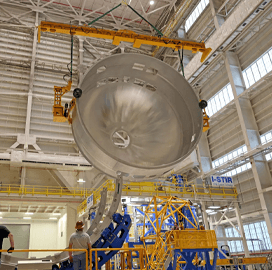NASA technicians have completed a portion of the fifth weld confidence article to be installed on the Space Launch System rocket.
The weld confidence article was built at the Michoud Assembly Facility in New Orleans, and will be part of the advanced upper stage of the SLS Block 1B configuration for the Artemis IV Moon mission, the agency said Friday.
The component belongs to the upper stage’s liquid oxygen tank to verify structural integrity. Before arriving at Michoud, the article’s dome was welded to the tank’s structural ring at the Marshall Space Flight Center in Alabama. Engineers from the Michoud and Marshall centers performed simultaneous tests and analysis to validate the hardware’s welding parameters.
NASA is also working with lead SLS contractor Boeing to construct structural test articles and SLS hardware structures at the New Orleans and Alabama facilities.





